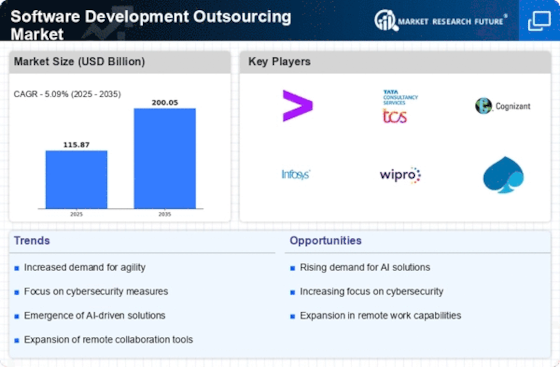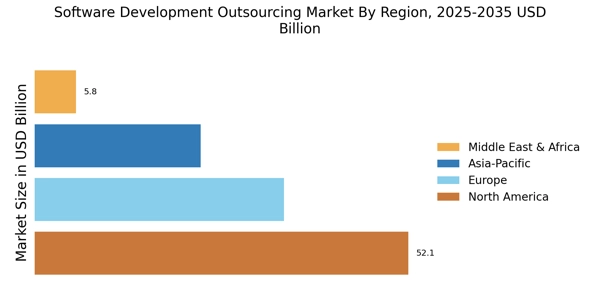Scalability and Flexibility
Scalability and flexibility are critical drivers in the Software Development Outsourcing Market. As businesses grow and evolve, their software development needs often change. Outsourcing provides organizations with the ability to scale their development efforts up or down based on project requirements without the constraints of hiring and training new staff. This flexibility is particularly advantageous in dynamic markets where demand can fluctuate rapidly. Companies can quickly adjust their outsourcing arrangements to meet changing needs, ensuring that they remain agile and responsive. Furthermore, outsourcing allows organizations to access additional resources and expertise as needed, facilitating the successful execution of complex projects. This adaptability is expected to be a key factor in the continued growth of the software development outsourcing sector.
Access to a Global Talent Pool
Access to a diverse and skilled talent pool is a significant driver in the Software Development Outsourcing Market. Organizations are increasingly recognizing the advantages of tapping into international expertise, which can lead to innovative solutions and improved project outcomes. By outsourcing, companies can engage with professionals who possess specialized skills that may not be readily available in their local markets. This access to global talent not only enhances the quality of software development but also fosters creativity and innovation. According to recent data, nearly 70% of companies report improved project performance when utilizing outsourced teams. As the demand for specialized skills continues to rise, the ability to access a broader talent pool will likely remain a key factor influencing outsourcing decisions.
Focus on Core Business Functions
A growing emphasis on focusing on core business functions is a notable driver in the Software Development Outsourcing Market. Organizations are increasingly recognizing the importance of concentrating on their primary objectives while delegating non-core activities, such as software development, to external experts. This strategic approach allows companies to enhance their operational efficiency and improve overall performance. By outsourcing software development, businesses can allocate more time and resources to their core competencies, which can lead to increased innovation and market responsiveness. Data suggests that companies that outsource non-core functions experience a 20 to 30% increase in productivity. As this trend continues, the outsourcing of software development is likely to become an integral part of many organizations' strategies.
Rapid Technological Advancements
The Software Development Outsourcing Market is significantly influenced by rapid technological advancements. As technology evolves at an unprecedented pace, organizations are compelled to adopt new tools and methodologies to remain competitive. Outsourcing software development allows companies to stay abreast of these advancements without the need for extensive in-house training or investment in new technologies. For example, the integration of artificial intelligence and machine learning into software solutions is becoming increasingly prevalent. By outsourcing to firms that specialize in these technologies, companies can leverage cutting-edge innovations and enhance their product offerings. This trend is expected to continue, as businesses seek to harness the latest technological developments to drive growth and improve efficiency.
Cost Efficiency and Resource Optimization
The Software Development Outsourcing Market is driven by the need for cost efficiency and resource optimization. Companies are increasingly seeking to reduce operational costs while maintaining high-quality software development. Outsourcing allows organizations to leverage lower labor costs in various regions, which can lead to substantial savings. For instance, it is estimated that outsourcing can reduce development costs by up to 30 to 50%. This financial incentive encourages businesses to outsource software development tasks, enabling them to allocate resources more effectively. Furthermore, by outsourcing, companies can focus on their core competencies while relying on specialized firms to handle software development. This trend is likely to continue as organizations strive to enhance their competitive edge in a rapidly evolving market.

















